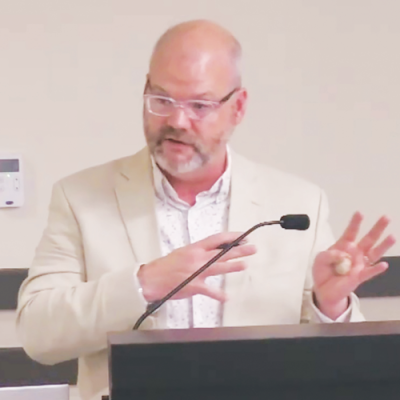
At the Madison Heights City Council meeting Nov. 25, Daniel Clark, with auditing firm Rehmann, delivered an “unmodified opinion” of the city’s audit, the highest mark a city can receive for its financial reports.
Screen capture taken from Madison Heights City Council meeting broadcast
MADISON HEIGHTS — The city of Madison Heights received top marks in its annual audit, which examined the city’s finances for the fiscal year that ended June 30, 2024.
The analysis was conducted by the auditing firm Rehmann. The city had previously contracted with another firm for more than 30 years.
Madison Heights City Manager Melissa Marsh explained that changing firms reduced the cost of the annual audit services by $26,165 for this fiscal year. She also said that the city wanted a fresh perspective on its policies and operations.
Daniel Clark, principal at Rehmann, shared his findings during the City Council meeting on Nov. 25, giving Madison Heights an “unmodified opinion.”
“That’s exactly what you’re looking for,” Clark told the council. “(An unmodified opinion is) the highest level of opinion that an auditor can give an organization such as yourself.”
One sign of good fiscal health was found in the general fund, where revenues exceeded expenditures for FY 2024 by $2.18 million. Clark pointed to rising property values — and the taxes collected from them — as one contributing factor. Investment returns were another.
“The market has seen a lot of positive increases — interest rates have risen — so as a result, the city’s general fund dollars are now earning on that interest, and you’ve seen a significant increase in investment gains,” Clark said, noting returns of about $1 million during FY 2024.
Revenues in the water and sewer fund also increased over the prior fiscal year, which Marsh said can be attributed to rate increases passed onto the city from the Great Lakes Water Authority and Oakland County.
Clark reserved his strongest praise for the city’s handling of pension liabilities, with 84% funded for general employees, and 61% funded for police and fire employees. Most impressively, Clark said, was the fact that other post-employment benefits were completely funded.
“It’s rare for cities to have positive fund balance for OPEB funding … often because it’s not something that’s strategically planned,” Clark said. “It’s rare (to have OPEB fully funded), not only across the state but throughout the country, as well.”
The general fund balance closed out the fiscal year at $15 million. Of this total, Marsh said about $4.4 million is being used for carry-forward projects — items that cross fiscal years or that are being set aside for future projects once additional funds are secure.
Clark said the city also impressed his firm with its professionalism. He said that first-year audits with a new client are often complicated, as the two sides learn to work together. That wasn’t an issue with Madison Heights. He thanked Marsh and Finance Director Linda Kunath.
“I’m happy to state that we encountered no difficulties while performing the audit,” Clark said. “Not only were all of the questions answered, and all the documentation provided, but … I really appreciate (the administration) for providing a good environment to perform this audit.”
Members of the City Council echoed that sentiment, with Councilman Quinn Wright saying he “salutes” Marsh and Kunath for their efforts. Councilman David Soltis said following the meeting that “Melissa Marsh has done a great job staying on top of the pension obligations for our employees. She’s always shown leadership on this front.”
Mark Bliss, the mayor pro tem, said that pension liabilities can be a “ticking time bomb” leading to financial disaster, so he’s relieved to see the city stay on top of it.
“Much of the problem with unfunded pension liabilities is tied into overly optimistic assumptions being used to calculate those liabilities,” Bliss said. “In the past, cities like Detroit and Flint were pushed into economic crisis in large part because of the financial burden paying out retirees while at the same time trying to keep their operations running.
“A substantial portion of every tax dollar is specifically paying for current retirees,” he added. “When we talk budgets, residents want to hear about roads we’re going to repair, or the police and firemen we’re going to invest in, but these pension liabilities are such an issue that if not done right, they will stop us from being able to spend money on all those other things.”
Bliss, who joined the council in 2013 and is now among its most veteran members, noted how the city’s long-term strategic planning changed in recent years with Marsh as the city manager.
“You see a lot of communities prioritizing short-term wins and not funding long-term liabilities because it becomes a future council’s problem. But that’s not how we do it here,” Bliss said. “We want to make sure that future councils can not only avoid financial catastrophe, but also serve their people from a position of financial strength.”
 Publication select ▼
Publication select ▼
























